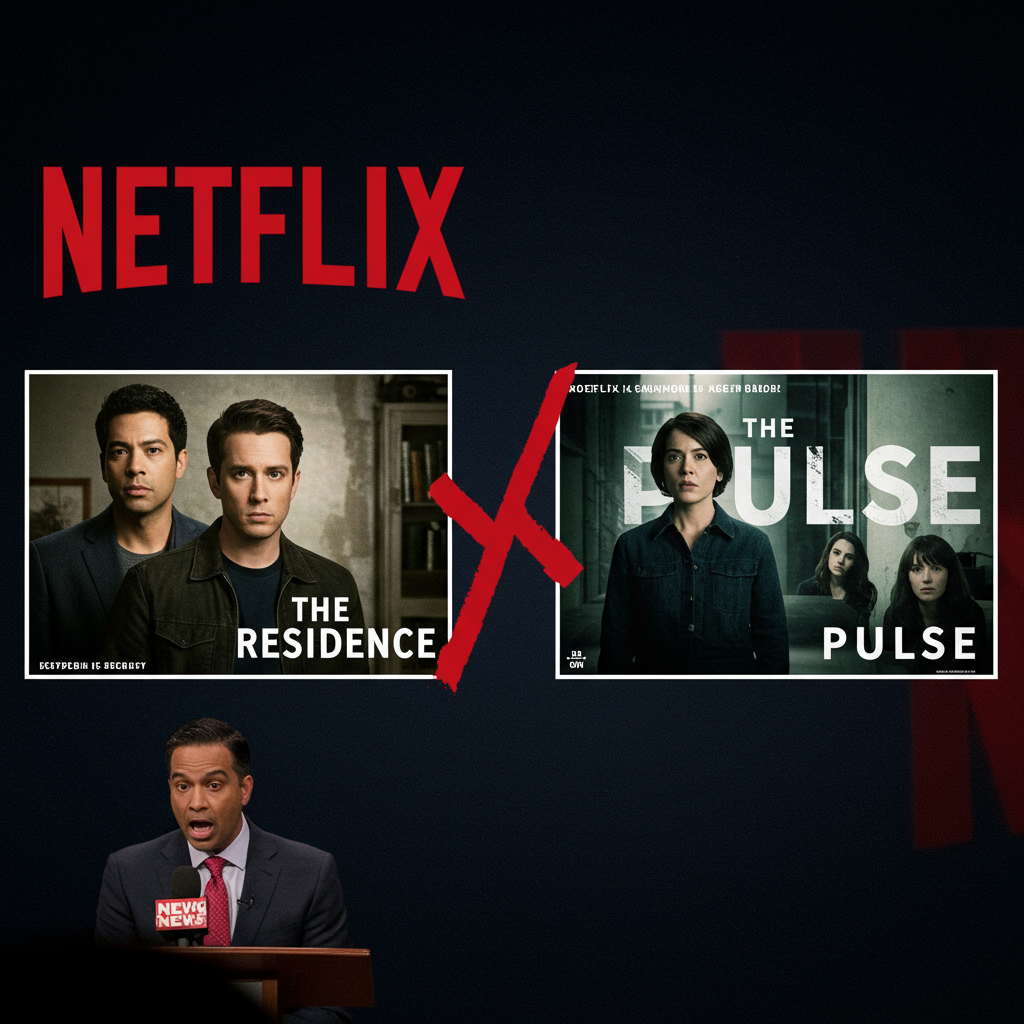netflix has delivered another dose of surprising news for subscribers, abruptly cancelling two recently launched original series after just a single season. This decision follows a pattern of rapid cancellations by the streaming giant, leaving fans and creators questioning the path forward for new shows. The affected series are the Shondaland production The Residence and the medical drama Pulse.
Both shows reportedly started strong upon their spring premieres, even appearing in Netflix’s coveted Top 10 most-streamed lists for a time. However, this initial visibility ultimately wasn’t enough to secure their future on the platform. This move adds The Residence and Pulse to a growing list of Netflix originals that failed to make it past their first season, reinforcing the streamer’s reputation for having a high bar for renewal.
The Shocking Cancellation of The Residence
Perhaps the more unexpected of the two cancellations is The Residence. This show hailed from Shondaland, the production company behind mega-hits like Bridgerton and Grey’s Anatomy. Created by Paul William Davies, The Residence was a unique blend of murder-mystery, romance, and comedy set within the White House during a State Dinner gone wrong.
The series boasted a talented ensemble cast. Uzo Aduba starred as the quirky detective Cordelia Cupp. Other notable actors included Giancarlo Esposito, Molly Griggs, Ken Marino, Randall Park, and Isiah Whitlock Jr. Beyond its star power and connection to a hit-making producer, The Residence also garnered significant critical acclaim. It held an impressive 85 percent score on Rotten Tomatoes, with critics praising its inventive approach. Eric Deggans of NPR called it a “superior, genre-blending TV experience.” Despite these positive factors, the show will not return for a second season.
Critical Acclaim Wasn’t Enough
The cancellation of The Residence highlights a trend where critical success and esteemed production connections don’t guarantee longevity on Netflix. While the exact reasons are often opaque, it suggests that metrics beyond reviews and initial buzz play a dominant role in renewal decisions. viewership numbers, specifically long-term engagement and completion rates, are widely believed to be key factors Netflix considers.
Pulse Fails to Deliver for Netflix
Pulse, on the other hand, represents a different scenario. This series was Netflix’s first significant foray into the traditional medical drama genre, a staple of network television. The show focused on a group of emergency room residents navigating the challenges of a busy Miami hospital.
While it reached the Top 10 initially, Pulse reportedly lacked the high-profile cast and critical praise that The Residence enjoyed. It did not achieve a high score on Rotten Tomatoes, unlike its cancelled counterpart. Timing might have also been a factor in its demise. Pulse premiered shortly after Max’s critically lauded medical drama The Pitt concluded its first season. The Pitt, which reunited ER veterans John Wells and Noah Wyle, received near-perfect reviews, scoring 95 percent on Rotten Tomatoes, potentially overshadowing Netflix’s new offering in the genre.
Navigating a Crowded Genre
Launching a new medical drama on any platform is challenging. The genre is saturated, with long-running hits and new contenders constantly emerging. For Netflix, establishing a foothold requires a show that not only attracts viewers initially but keeps them watching and talking. Pulse seemingly did not meet the necessary benchmarks to justify a second season, even as a new venture for the streamer.
A Pattern of Swift Cancellations
These two cancellations are not isolated incidents. They follow closely on the heels of another round of four original series being axed less than two months prior. This contributes to an overall perception that securing a renewal on Netflix, especially for new shows, is becoming increasingly difficult.
One prominent example of this trend is the recent cancellation of the spy thriller The Recruit. Despite starring Noah Centineo, a known quantity for Netflix audiences from his popular teen films, and receiving positive critical reviews for its second season (a 92% Rotten Tomatoes score), the show was cancelled after just two seasons.
The Recruit’s Downfall Explained
Multiple factors reportedly contributed to The Recruit‘s end. The primary reason cited was a significant decline in overall viewership for Season 2 compared to Season 1. While Season 1 spent five weeks in the Netflix Top 10, Season 2 only managed three weeks. Furthermore, the second season had a reduced episode count, dropping from eight to six. A key issue highlighted was the show’s poor scheduling. Season 2 premiered just one week after Netflix’s other successful spy series, The Night Agent, which had significantly higher viewership numbers. This back-to-back release may have split the audience or led viewers to prioritize the more established hit. Lack of significant promotional support for The Recruit also likely played a role.
Even being a relatively inexpensive show to produce, estimated at around $5 million per episode before tax breaks, wasn’t enough to save it when core viewership metrics didn’t meet Netflix’s internal thresholds, particularly when compared to the massive audience of hits like The Night Agent.
A Glimmer of Hope: The Geek Girl Renewal
In contrast to the cancellations, Netflix recently announced the renewal of the series Geek Girl for a second season. This decision provides some insight into what can save a show. Geek Girl, based on the popular young adult novels, also premiered in May 2024 and maintained a presence in the Netflix Top 10.
While its viewership wasn’t record-breaking, the show achieved a perfect 100% score on Rotten Tomatoes and cultivated a devoted fanbase who actively campaigned for its renewal online. This suggests that a combination of strong critical reception and clear fan engagement, even if viewership is moderate, can sometimes sway Netflix’s decision-making process, offering a different path to survival compared to relying solely on blockbuster viewership numbers like The Night Agent.
What This Means for Viewers and Creators
The recent wave of cancellations and the varied reasons behind them paint a complex picture of Netflix’s strategy. It seems the platform is constantly evaluating the cost-effectiveness and audience engagement of its content. Shows with lower production costs might have a slightly lower viewership bar, but ultimately, consistent and high engagement is crucial.
The swiftness of some decisions, like The Recruit‘s cancellation just weeks after its premiere, indicates that data is being analyzed rapidly. For creators, this means shows need to hook viewers quickly and maintain momentum. For viewers, investing time in a new series comes with the inherent risk that it might not last beyond a season or two, regardless of quality or initial popularity. Understanding Netflix’s focus on metrics like completion rates and sustained viewership can help manage expectations.
Frequently Asked Questions
Why did The Residence get cancelled despite having high critical scores?
The Residence received strong praise from critics, earning an 85% score on Rotten Tomatoes. However, Netflix’s renewal decisions are primarily driven by internal metrics beyond critical reception. These include overall viewership numbers, how quickly viewers watch a season, and completion rates (how many viewers finish a series once they start it). Despite critical success and initial popularity in the Top 10, The Residence likely did not meet Netflix’s specific benchmarks for sustained audience engagement required for a second season compared to its production cost.
What were the main reasons Netflix cancelled The Recruit after two seasons?
The Recruit was cancelled primarily due to a significant drop in overall viewership for its second season compared to its first. Season 2 spent less time in Netflix’s Top 10 than Season 1. Other factors included potentially poor scheduling, as it premiered only a week after the more popular spy series The Night Agent, possibly dividing the audience. Despite improving critical scores (92% for Season 2) and being relatively cost-effective to produce, the decline in viewership against internal targets led to its swift cancellation.
Given these cancellations, how can viewers tell if a new Netflix show is likely to be renewed?
It’s challenging to definitively predict which Netflix shows will be renewed, as decisions are based on complex internal data. However, look for shows that not only appear in the Top 10 but remain there for several weeks. Strong social media buzz and fan engagement can sometimes help, as seen with Geek Girl‘s renewal. Shows with massive initial viewership (like The Night Agent) have a higher chance, even if viewership drops slightly in later seasons. Ultimately, Netflix seeks shows with high completion rates and sustained global interest relative to their budget.
Conclusion
The recent cancellations of The Residence and Pulse, following other series like The Recruit, underscore the competitive landscape of streaming. Even critically acclaimed shows from successful production houses or shows representing new genre ventures face an uphill battle for survival if they don’t meet Netflix’s internal performance metrics, primarily centered around global viewership and engagement. While initial popularity helps, sustained viewing seems to be the key factor determining whether a series earns a second chance on the platform. Viewers should be aware that starting a new Netflix show comes with an inherent risk of a single-season run, regardless of how promising it initially appears.
Word Count Check: Approximately 1090 words




